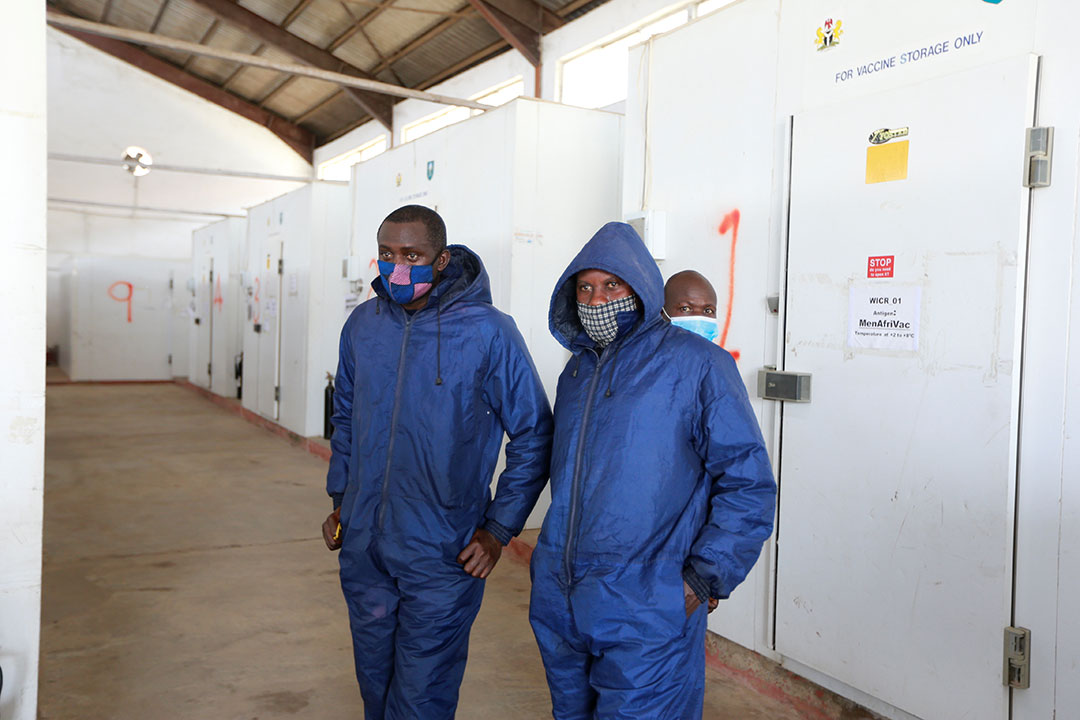Nigeria Forced to Adapt Vaccine Plan
ADF STAFF
Engulfed in a deadly second wave of COVID-19, Nigeria is nearly ready to fight back with the best weapon science can offer — a vaccine.
Its ambitious goal is to vaccinate 40% of its citizens by the end of the year, but Africa’s most populous country is counting on tens of millions of doses it does not yet possess.
The government has unveiled a comprehensive distribution plan, yet it is in constant flux due to an array of complex local and global challenges.
“The National Primary Health Care Development Agency has indicated that vaccines will be administered in four phases,” Chairman of the Nigeria Governors Forum Kayode Fayemi announced January 21. “They are based on vaccine type and availability, initially for front-line health workers, then the aged (55 and over), persons with underlying medical conditions and other target groups.”
The country of more than 200 million people has 121,566 confirmed cases and 1,497 deaths, according to January 24 statistics from the Africa Centres for Disease Control and Prevention. However, officials estimate more widespread infection exists because of a significant testing shortfall.
In late January, Nigeria was setting new records in daily cases, according to Dr. Faisal Shuaib, a member of Nigeria’s COVID-19 task force.
“In the last couple of weeks, we’ve started to see an increase in the number of cases,” he said on a January 25 United Nations podcast. “We’re also beginning to see some of the isolation centers overflow.
“The reality is that in Nigeria the second wave is here.”
Shuaib, who is also executive director of the health care agency, helped craft Nigeria’s plans to achieve herd immunity by vaccinating 70% of the population — 40% this year and 30% by the end of 2022. To do so, the government is budgeting almost $2 billion for vaccines, infrastructure and distribution.
The cost is just one challenge Nigeria faces. Global demand for the vaccine is extremely high, while supplies are relatively low. Most of the needed infrastructure, such as ultra-cold chain storage, is practically nonexistent. Other issues that contribute to a daunting logistical task include instability, the terrain, population density and climate.
While the virus will continue to spread throughout this year and next, President Muhammadu Buhari urged citizens to observe strict prevention measures.
“Keeping our country safe from a resurgent cycle of COVID-19 as this administration finalizes its plans to procure and efficiently and effectively distribute the COVID-19 vaccines is a duty which we all have and share,” he said in his January 1 broadcast.
Nigeria hopes to get 42 million vaccines for 20% of its population through the global COVAX initiative. That includes the country’s first delivery — 100,000 doses of the Pfizer vaccine.
Shuaib said the first batch would protect 50,000 people, equal to about 0.00025% of Nigeria’s population. He also said Nigeria bought three ultra-cold freezers to keep the Pfizer doses at the necessary temperature.
Signaling a sudden pivot to vaccines that can be stored in regular freezers, he said in a task force briefing that “the AstraZeneca/Oxford vaccines are the ones that we want to invest in, because we already have the infrastructure across the country to store the vaccines.”
In an online press conference on January 25, Boss Mustapha, chairman of the task force, delivered mostly bad news with one positive development:
- The 100,000 doses of the Pfizer vaccine expected in late January were delayed by two to four weeks because of supply and manufacturing issues.
- Scientists sequencing variants of COVID-19 have found several cases of the more-infectious strain first reported in the United Kingdom.
- In the previous week, Nigeria conducted 58,974 tests and confirmed 11,179 cases with 62 deaths.
- An order for 10 million doses was placed through the Africa Vaccine Acquisition Task Team of the African Union Commission, which has secured 270 million provisional doses with $2 billion in financing by Africa Export-Import Bank for a whole-of-Africa approach.
Waiting for more good news might be the hardest part.
“We wish to assure all Nigerians that the vaccines will be safe and effective when eventually it is deployed,” Mustapha said. “We enjoin everyone to join in the campaign to eliminate vaccine hesitance.”


Comments are closed.